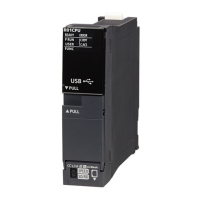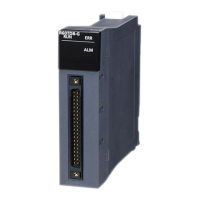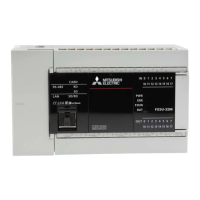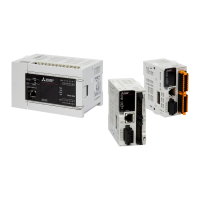8 BUILT-IN ETHERNET FUNCTION INSTRUCTIONS
8.5 File Transfer Function Instructions
1125
8
• Specify the transfer source drive number (2 to 4) of the CPU module, the folder path where the files are stored, and the file
name (including an extension) in (s2) in Unicode string. The maximum number of characters used in a file path is 255. The
maximum number of characters used in a path, excluding the file name, is 246 (not including a delimiter). Use one-byte '\' or
'/' as a delimiter to specify the boundaries between the elements in a file path.
• Wild card characters (*, ?) can be used in the file name or the extension specified in (s2).
Wild card characters do not recognize periods.
Using wild card characters in the following ways results in an error.
When any wild card character is used, the number of files that can be transferred is determined by the total size of the file
names of the specified files. The specified files can be transferred when the number of these files and the total size of the file
names satisfy the following condition. If a file transfer function instruction is executed without satisfying the following condition,
the instruction completes with an error.
• If an error occurs in any one of the files to be transferred during execution of the SP.FTPPUT instruction, the transfer
processing will be stopped upon detection of the error, and the rest of target files will not be transferred.
• Untransferable files will not be transferred even though the wild card specification conditions are satisfied.
• If the number of characters in the file path which includes a file name and an extension exceeds 255, files will not be
transferred even though the wild card specification conditions are satisfied.
(1)Drive numbers that can be specified are 2 to 4.
(2)Use one-byte ':\' or ':/' as a delimiter of the drive number.
(3)Use one-byte '\' or '/' as a delimiter of the folder path and file.
(4)The specified file name should include an extension.
Symbol Description
* An asterisk '*' is replaced with any character or string (including none) in a file name.
? A question mark '?' is replaced with a character (excluding none) in a file name. ('?' can be used multiple times.)
• Two or more asterisks '*' are used in a file name (before the period) or an extension. (Example: *abc*.txt)
• An asterisk '*' and a question mark '?' are used in a file name (before the period) or an extension. (Example: *ab?. txt)
(Fi + NM) + 1 < 65536 [bytes]
N: Total number of files that match the wild card specification
Fi: Total size of the file names that match the wild card specification
M: Specific information size (Fixed value: 6 bytes)
255 characters maximum
[… "2:\database1\recipe\recipe_db.txt" …]
(1) (4)(2) (3)
0000H
(s2)+n
(s2)+2
(s2)+1
(s2)
b15
·
b0
1st character
2nd character
3rd character
n + 1st character
255 characters
maximum
Null character (end of string)

